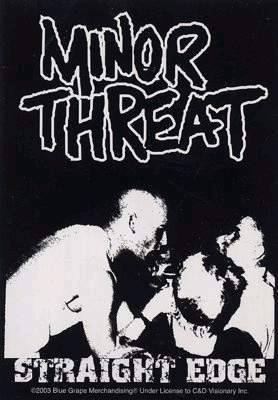Jello Biafra
The Definition of Straight Edge : How this Philosophy of Life Relates to Punk Music
 | Introduction to Straight EdgeA lifestyle. A personal choice. A philosophy. These definitions truly encompass what the term "straight edge" means. In truth, straight edge can be considered a subculture of its own, branching off punk rock music because the core ideals of the punk movement were adopted by the straight-edgers. HistoryThe term became popular within the punk scene when Minor Threat addressed the lifestyle in their song, "Straight Edge." Frontman and lyricist Ian MacKaye for Minor Threat wrote the following lyrics as a way to let the public know he doesn't need to use drugs just because he's part of the punk scene: |
"I'm a person just like you
But I've got better things to do
Snort white s*** up my nose
Pass out at the shows
I don't even think about speed
That's something I just don't need
I've got the straight edge"
"Straight Edge" was meant to portray that by abstaining from all drugs and alcohol, the band had the "edge" up on other musicians who let those influences get the better of them.
In short, adopting the straight edge lifestyle put individuals in control of their own lives; it held them accountable for personal responsibility.
While the term cannot be put into a box and definitively labled, there are a number of characteristics most straight edge people have in common.
 When someone makes the personal choice to commit to the straight edge lifestyle, they are saying they don't need drugs, alcohol or other outside influences to run their lives. | Common Characteristics of Straight Edge PeopleFor one, straight edge people usually do not drink or do drugs. Some may be vegetarians or vegans and might even abstain from casual sex with others. A lot of straight edge people will even avoid caffeine and other stimulants because it does not fit with the lifestyle they've chosen for themselves. Straight edge is a way of life, and those who live by this philosophy have chosen the path for themselves. It's not something people are born into or can arbitrarily become. |
Straight Edge or Square?
Bear in mind that just because someone abstains from drug use does not necessarily mean they are straight edge. You can be drug-free, but not adopt the other lifestyle choices common to a straight-edger.
Similarly, you can be a vegetarian but not associated with the straight-edge movement because you haven't made a conscious decision to follow that life-path. People may share certain characteristics with straight-edgers, but unless they have chosen to adapt to that lifestyle they are not straight edge.
Dave Peters from Throwdown puts it nicely (from an interview on Truepunk.com):
"For me personally I've been straight edge for about 12 years and it's kind of ingrained in who I am. [It's] a personal choice... by definition, it's an individual choice."
Straight edge became closely identified with the punk scene as a subculture because straight-edgers shared common characteristics with members of the punk community.
For example, the punk culture was known for its disdain for authority figures, its individualism and care-free attitudes. Straight-edgers adopted these attitudes, but adapted the culture to fit their own beliefs that weren't so readily apparent in the punk movement (i.e., abstaining from illicit substances).
Confusion about the term
Some people may confuse straight edge with religion, but it's not a religion - it is a philosophy. The confusion is understandable though, because in the early days when straight edge first appeared, those who subscribed to this lifestyle believed a clear head would help them focus on their spirituality.
But straight-edgers do not all conform to one religion. There are atheists, agnostics and Christian people who consider themselves straight edge. In the beginning, bands like Shelter and 108 even helped spread a Hare Krishna movement that many straight-edgers adopted for themselves.
You don't have to affiliate with any one particular religion to be straight edge. You just have to consciously follow a path that allows you to take care of yourself and your personal responsibilities without letting outside influences interefere.
While this article cannot hope to cover all the complexities of the straight edge philosophy, it should be known that straight edge people have chosen to embrace this lifestyle for their own reasons.
In short, it's a lifestyle that promotes a positive way of living.
NOFX Respond to Tegan and Sara Controversy
| Hell hath no wrath like a Tegan and Sara fan scorned. Just ask NOFX's Fat Mike, who's in hot water with the out twin duo's legion -- and, arguably, rightly so. You see, on NOFX's new album, 'Coaster,' frontman Fat Mike recounts an awkward meeting with one-half of the sisters Quin in the song, 'Creeping Out Sara.' He sings about not being sure of which sister he's talking to, and asks, with tongue-in-cheek, if they'd "ever had a threesome where they both ganged up one girl." Naturally, some of Tegan and Sara's fans, and many in the lesbian community, expressed disgust and even decried homophobia on Fat Mike's part. So, Spinner recently caught up with Fat Mike to clear the air. |
| "It's basically a true story," Mike tells Spinner. "I was drunk, we did hang out at a festival and we were talking about sex. I mean, I'm dissing myself! I sound like a drunk creep, so I don't know what the problem is. Their fans think I'm making fun of them, but I'm not. We had a really nice time that day." After the festival, Mike found out that Tegan was the Quin sister he met that fateful day, but he has his bases covered. "On the vinyl version of the album, it's called 'Creeping out Tegan,'" he says. "I played it safe, and wrote both versions since I wasn't sure." Tegan has been in touch with Mike but | |


